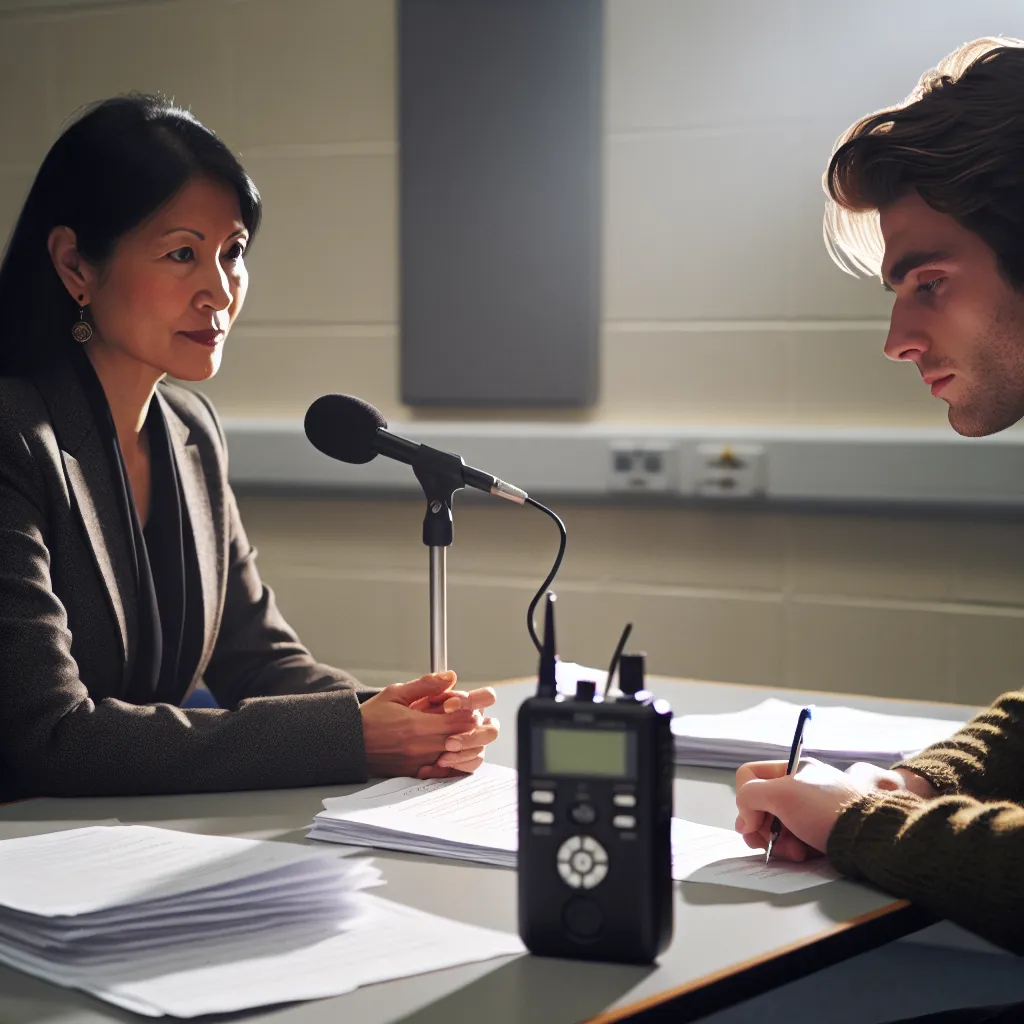The IELTS Speaking test often includes questions about personal experiences and achievements. One common topic is describing a time when you achieved something you are proud of. This article will guide you through answering such questions effectively, helping you aim for a high band score in your IELTS Speaking test.
Nội dung bài viết
Understanding the Topic
The topic “Describe a time when you achieved something you are proud of” is a popular one in IELTS Speaking tests. It allows examiners to assess your ability to narrate a personal experience, express emotions, and reflect on past events. This topic has appeared frequently in past tests and is likely to continue being a staple in future examinations.
 IELTS Speaking Test Environment
IELTS Speaking Test Environment
Part 1: Introduction and Interview
In Part 1, the examiner may ask general questions related to achievements and pride. Here’s an example question with a suggested answer:
Question: Do you often feel proud of yourself?
Band 6-7 Answer:
Yes, I sometimes feel proud of myself, especially when I accomplish something challenging. For example, I felt quite proud when I finished my first marathon last year.
Band 8-9 Answer:
I’d say I experience a sense of pride occasionally, particularly when I overcome significant obstacles or achieve long-term goals. A recent instance that comes to mind is when I successfully implemented a community recycling program in my neighborhood, which had been a long-standing ambition of mine.
Part 2: Long Turn
Here’s a sample cue card related to the topic:
Describe a time when you achieved something you are proud of
You should say:
- What you achieved
- When and where it happened
- How you achieved it
- And explain why you feel proud of this achievement
Band 6-7 Answer:
I’d like to talk about the time I graduated from university with honors. This happened three years ago at my university in London. I achieved this by studying hard throughout my course, particularly in my final year. I spent many hours in the library, attended all my lectures, and sought help from my professors when needed.
I feel proud of this achievement because it represents years of hard work and dedication. It wasn’t easy balancing my studies with part-time work and other responsibilities, but I managed to do it. This achievement has opened up many opportunities for me in my career.
Band 8-9 Answer:
I’d like to share an experience that fills me with immense pride – successfully organizing a large-scale charity event in my hometown last summer. This event was a culmination of months of planning and coordination, involving various local businesses, volunteers, and community leaders.
To bring this vision to fruition, I had to leverage my networking skills, demonstrate leadership, and overcome numerous logistical challenges. I began by forming a dedicated team, delegating responsibilities based on individual strengths. We then meticulously planned every aspect, from securing sponsorships to marketing the event across multiple platforms.
The sense of pride I feel stems from several factors. Firstly, the event surpassed our fundraising goals, providing substantial support to local educational initiatives. Secondly, it fostered a strong sense of community spirit, bringing together people from diverse backgrounds for a common cause. Lastly, orchestrating such a complex event significantly enhanced my project management and leadership skills, which have proven invaluable in my professional life.
This achievement stands out as a testament to the power of perseverance and collective effort. It reinforced my belief in the positive impact one can have when channeling passion into action.
Follow-up Questions
Question: How do you usually celebrate your achievements?
Band 6-7 Answer:
I usually celebrate my achievements by treating myself to a nice meal or spending time with friends and family. Sometimes, I might buy myself something I’ve been wanting for a while as a reward.
Band 8-9 Answer:
My approach to celebrating achievements tends to be multifaceted. While I certainly enjoy indulging in some immediate gratification, such as a gourmet meal or a short trip, I also believe in celebrating in ways that contribute to long-term growth. This might involve investing in a course or tool that furthers my skills, or setting aside time for reflection to fully appreciate the journey and lessons learned. Additionally, I often find great joy in sharing my success with those who supported me along the way, perhaps through a gathering or by expressing my gratitude individually.
Part 3: Two-way Discussion
Examiner: Do you think people today have more or fewer opportunities to achieve great things compared to the past?
Band 6-7 Answer:
I believe people today have more opportunities to achieve great things compared to the past. With advances in technology and education, we have access to more resources and information. The internet has made it easier to learn new skills and connect with others globally. However, there’s also more competition nowadays, which can make it challenging.
Band 8-9 Answer:
This is a nuanced question that requires careful consideration. On one hand, the digital age has undeniably democratized access to information and resources, creating unprecedented opportunities for innovation and achievement. The interconnectedness of our global society allows ideas to spread rapidly and collaborations to form across vast distances, potentially accelerating the pace of progress.
However, we must also acknowledge the flip side of this coin. The increased connectivity has led to heightened competition on a global scale, potentially making it more challenging for individuals to stand out. Moreover, the rapid pace of technological change means that skills can become obsolete quickly, requiring constant adaptation.
Another factor to consider is the evolving definition of ‘great achievements’. In the past, these might have been more focused on scientific discoveries or technological inventions. Today, we’re seeing a broader recognition of achievements in areas like social justice, environmental sustainability, and mental health awareness.
Ultimately, while the nature of opportunities has changed, I believe that the potential for great achievements remains strong. The key lies in our ability to harness these new tools and platforms effectively, while maintaining the resilience and adaptability necessary to thrive in a rapidly changing world.
Key Vocabulary and Phrases for High Scores
-
To bring a vision to fruition (phrase) /tə brɪŋ ə ˈvɪʒən tə fruˈɪʃən/: To make a plan or idea become reality.
Example: After years of hard work, she finally brought her vision of a sustainable community to fruition. -
To leverage (verb) /ˈlevərɪdʒ/: To use something to maximum advantage.
Example: He leveraged his networking skills to secure funding for the project. -
To orchestrate (verb) /ˈɔːkɪstreɪt/: To plan or coordinate an event or situation carefully.
Example: The team successfully orchestrated a complex marketing campaign across multiple countries. -
Testament (noun) /ˈtestəmənt/: Something that serves as evidence or proof of a specified quality.
Example: Her academic achievements are a testament to her intelligence and hard work. -
To channel (verb) /ˈtʃænl/: To direct towards a particular end or object.
Example: She channeled her frustration into creating a successful business.
Examiner’s Advice
To excel in the IELTS Speaking test, particularly when discussing achievements:
- Practice narrating your experiences with a clear structure (what, when, where, how, why).
- Use a range of vocabulary, especially words and phrases that express emotions and personal reflection.
- Develop your ideas fully, providing specific details and examples to support your points.
- Work on your fluency by regularly discussing various topics in English.
- Pay attention to your pronunciation and intonation to ensure clear communication.
Remember, the key to a high score is not just about what you say, but how you say it. Confidence, fluency, and the ability to express complex ideas clearly are all crucial factors in impressing the examiner.
For more tips on IELTS Speaking, you might find these resources helpful:
- How to Describe a Time You Completed a Challenging Task
- How to Describe a Time You Felt Very Happy in IELTS Speaking
By following these guidelines and practicing regularly, you’ll be well-prepared to discuss your proud achievements in your IELTS Speaking test with confidence and eloquence.


